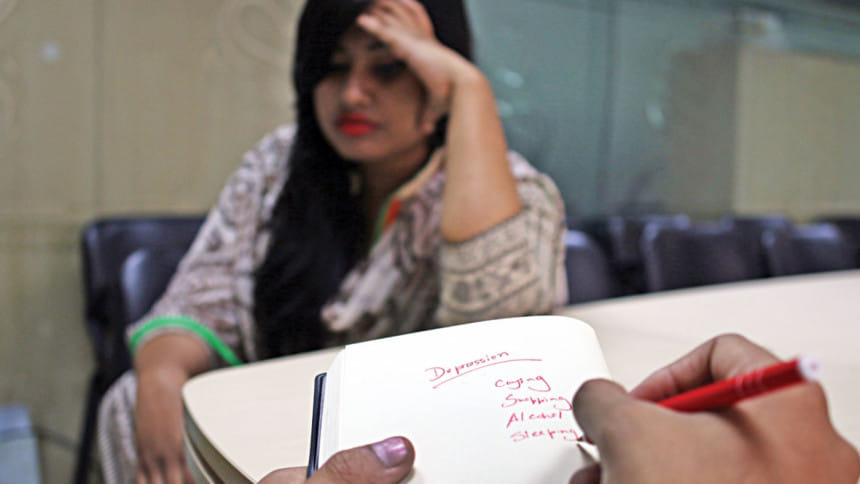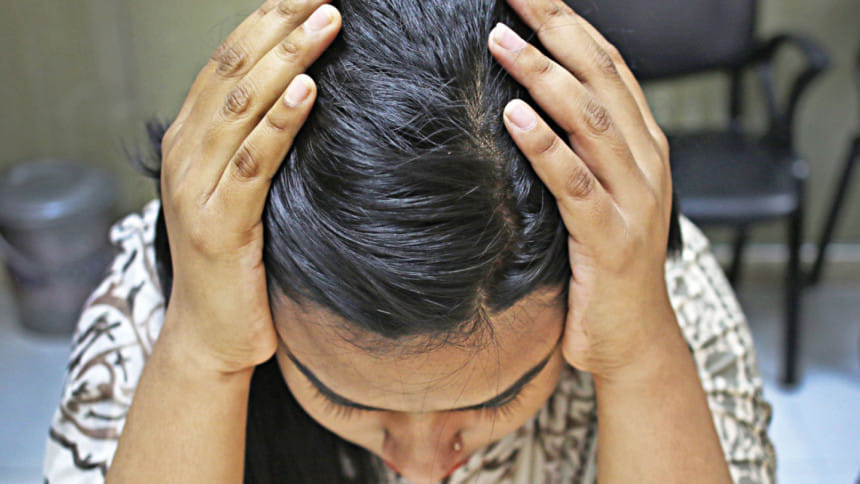Out in the Open

When 26-year-old Tasmia Jahan would stay mostly awake, experience bouts of dizziness, gain weight, display strange cases of mood swings, suffer from anxiety attacks and suddenly burst into tears, her family thought she was just lonely and needed to get married.
Teaching at the primary level at a well-known English medium school in Chittagong, Tasmia belonged to a well-to-do family. Not only was she a good student, but was also very popular amongst her peers and her students. Marriage being the only solution for most of the families in the country, Tasmia was married off to a banker based in Dhaka. Eventually however, Tasmia got worse and was diagnosed with Disorganised Schizophrenia -- often incoherent in speech and thought, but not necessarily have delusions. Many such mental problems have no cure, however, these problems can be taken care of if family members and close friends can identify symptoms and get immediate professional help, instead of ignoring the issue.


"We usually do not talk about mental health issues. I think our lack of understanding is partly responsible for this," says Laila Khondkar, Director-Child Protection, Save the Children. "We are not aware that anyone can suffer from mental health problems, and when that happens we need to seek support as we do when we face physical health challenges. Families consider it to be their 'failure' if a member has mental health issue and are in denial. There is lot of stigma associated with mental health."
According to a recent report by iccddr,b, mental disorders in Bangladesh are a serious but overlooked problem. Better data, awareness and more mental health practitioners are needed to address the unmet needs for mental health care.
Labiba Mohsin is a retired college lecturer, a mother and a grandmother. She herself is a patient of ADHD - Attention Deficit Hyperactivity Disorder; a brain disorder marked by an ongoing pattern of inattention and/or hyperactivity-impulsivity that interferes with functioning or development. "I was always a very active child and never would I sit still somewhere," she says. "Of course, this is considered to be healthy in a child. However, this became an issue when I was a teenager. It became very difficult for me to focus on one thing - like studies. I was having problems concentrating. I would start a task with a lot of enthusiasm and eventually never complete it. I would do 5-6 things at one time - and trust me, that is not what you call multitasking! My attention would divert from one task to another, from one book to another, from one colour to another and I was beginning to shift my focus so much that I began to have severe headaches. I would get depressed easily and start crying for no reason. After I got married, I noticed similar patterns of hyperactivity in my first born daughter. We were in London and thankfully, there was professional help ready for hyperactive children, to help them focus. That's when I figured that both my daughter and I suffered from a disorder called ADHD."
According to Laila Khondkar, women face additional challenges in getting support in depression or other mental health problem. "If a woman with mental health problem becomes a mother then raising the child can be a challenging experience for her, especially when there is so limited understanding and support for mental health patients," she says.
Even though discussing mental health issues is considered a taboo in the country, several reports and literature, both online and offline highlight the common disorders experienced by people in Bangladesh -- depression, anxiety, psychiatric and behavioural disorders. The situation gets worse when such disorders are coupled with chronic diseases of the physical body.
According to the report published by iccddr,b, the overall prevalence of mental disorders in Bangladesh is between 6.5 to 31 percent among adults, with psychiatric and psychogenic disorders such as depression, anxiety and neurosis most commonly reported.
The report further said that prevalence of mental disorders is much higher in overcrowded urban communities than rural ones, and among the poor. Women are vulnerable across all settings -- especially in countries belonging to South Asia. Behavioural disorders were most common among children, but psychiatric disorders were also reported among socially disadvantaged children, such as those living in urban slums. The evidence suggests that psychiatric disorders among children are associated with malnutrition, low education of fathers and a family history of mental illness, according to the report "What is the state of mental health in Bangladesh?"
It can be presumed that the urban madness in Dhaka city, lack of open spaces, a rise in the number of criminal activities, newspaper headlines, TV shows, media, traffic etc are heavily influencing our way of thinking and our day-to-day habits. More and more young people are getting frustrated. Many women feel all the more oppressed and suppressed. "It is true that many young people are frustrated and want to leave the country. But many are showing resilience also. They are well-informed, ambitious, engaged in creative activities. Women as well, are achieving remarkable things despite the challenges," adds Laila Khondkar. "But as I mentioned earlier, it is seen that women face additional challenges in getting support in depression or other mental health problems and it gets all the more difficult when the woman becomes a mother."

Mental health problems can also arise due to drug abuse. A critical concern for children and young people especially, it is very important to open up platforms of dialogues so that the issues can be resolved instead of turning away, being in denial and practicing ignorance.
As soon as something feels out of the ordinary, one must seek professional help. "People in Dhaka usually get professional help from the limited number of psychiatrists in public and private sectors," says Laila. "In addition to appropriate type of medication at the right dose it is very important to have a healthy lifestyle as well as a supportive network of family and friends in order to maintain a functional life while facing a mental health problem. People suffering from mental illness go through lot of sufferings; and it takes a huge amount of courage, determination, patience to face the condition and maintain a regular life."
Children and young people can be encouraged to stay active and indulge in both physical and mental games and activities to help them focus on the positive. "Parents need to understand their children and spend quality time with them in order to know their feeling and thoughts, which will be helpful in providing the required guidance to the children," adds Laila. "Parents can also model certain behaviours (not only advising) that will help children in gaining values for the rest of their lives."
In addition, schools and teachers also play a significant role. "There must be playgrounds for children in residential areas and schools. Children should get the opportunity to play, learn to socialise in the real world (not only in virtual settings), and remain engaged in enjoyable and stimulating activities," she says.
Most importantly, we must be more open minded and build a platform where children, young people and the distressed will be able to make use of and engage in dialogues. Healthy and positive interactions will definitely change the society for the better.

 For all latest news, follow The Daily Star's Google News channel.
For all latest news, follow The Daily Star's Google News channel. 



Comments